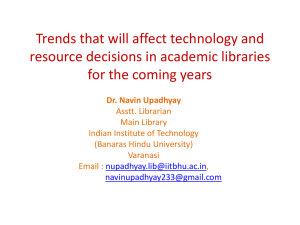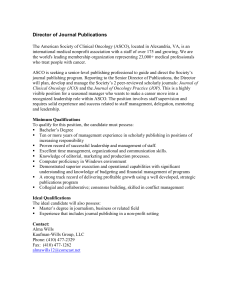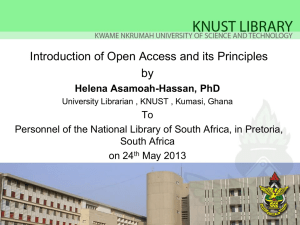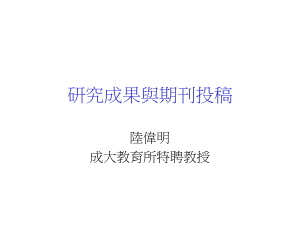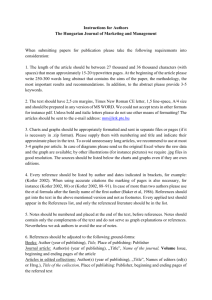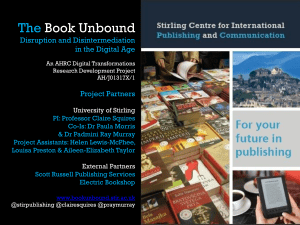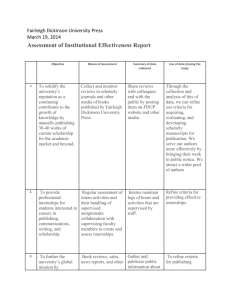the resurgence of imperialism, this time represented by knowledge
advertisement
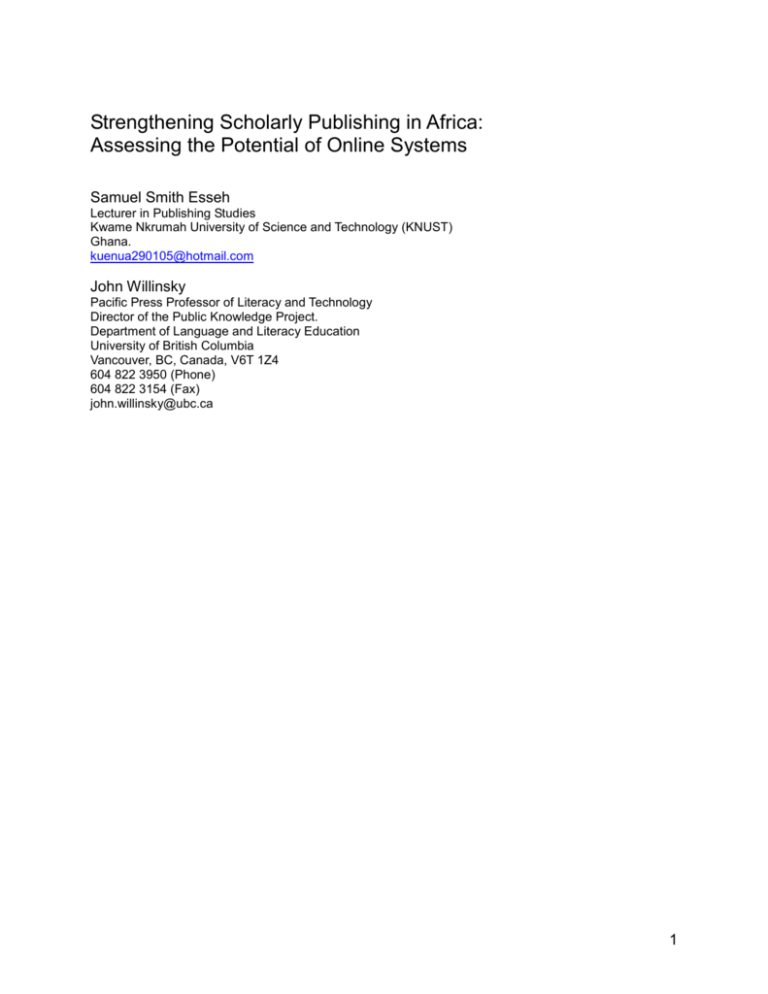
Strengthening Scholarly Publishing in Africa: Assessing the Potential of Online Systems Samuel Smith Esseh Lecturer in Publishing Studies Kwame Nkrumah University of Science and Technology (KNUST) Ghana. kuenua290105@hotmail.com John Willinsky Pacific Press Professor of Literacy and Technology Director of the Public Knowledge Project. Department of Language and Literacy Education University of British Columbia Vancouver, BC, Canada, V6T 1Z4 604 822 3950 (Phone) 604 822 3154 (Fax) john.willinsky@ubc.ca 1 Strengthening Scholarly Publishing in Africa: Assessing the Potential of Online Systems Summary After all that has gone into improving research library access to online publications in Africa, and now that access to research, internet bandwidth and librarian technical skills are improving, the next logical step in this strategy is to direct these developments toward the support of local scholarly publishing initiatives that will increase access to African research and advance local research capacities. This project is intended to research and assess the potential contribution of online publishing systems for African scholarly journals. Working in association with the Public Knowledge Project (PKP) at the University of British Columbia, Samuel Smith Esseh will visit 6-8 universities across sub-Saharan Africa, to meet with and survey journal editors and academic librarians in an effort to assess both the current state of scholarly journal publishing and the potential value of utilizing online journal management and publishing systems that could increase both African research and global access to African research. As a result of this analysis, this study will assess (1) the state of scholarly publishing among journals in 6-8 regions of Africa, with regard to editorial structures, economics, technologies (print and Internet), and incentives, (2) levels of support for online access to scholarly materials, both African and global, and the (3) the feasibility of research libraries or other academic centers establishing Online Scholarly Publishing Sites (OSPS) to host and support existing and new academic journals through the use of PKP’s Open Journal Systems (OJS), an open source journal management and publishing system. The proposed OSPS model is based on the IBICT SEER program in Brazil, which supports the online management and publishing of 63 Brazilian journals using OJS. One source of potential support and training for the sustainability of the OSPS model comes from Smith Esseh’s work in the Publishing Studies program at Kwame Nkrumah University of Science and Technology in Ghana. Potential Benefits of the Online Scholarly Publishing Sites (OSPS) Model Immediate Library-based OSPS is able to manage and publish multiple journals. Integrates and indexes African content across institutional repositories and journals. Creates a well-documented implementation model for university libraries. Develops OSPS workshop materials for extending African roll-out. Long Term Development of a training and support center for scholarly publishing studies. Increased African and global access to (and indexing of) African research. Increased African participation in scholarly publishing, reviewing, and editing. Reduced and sustainable publishing costs for journal publishing in Africa. Greater global knowledge exchange and fostering of knowledge economies. 2 Strengthening Scholarly Publishing in Africa: Assessing the Potential of Online Systems Background Some 40 years ago, the United Nations Educational, Scientific, and Cultural Organization (UNESCO) set out guidelines for the development of higher education in Africa that included the “elucidation of and appreciation for African culture and heritage and to dispel misconceptions of Africa, through research and teaching of African studies,” as well as developing “a truly African pattern of higher learning dedicated to Africa and its people yet promoting a bond of kinship to the larger human society” (UNESCO, 1963, 3). Yet no sooner had research libraries in Africa and other parts of the developing world begun to build modest journal collections in the hundreds, and even thousands, of titles during the 1960s and 1970s, then those collections were decimated by subscription-price increases, currency fluctuations, and local economic troubles. Addis Ababa University in Ethiopia, for example, lost 70 percent of its 1,200 subscriptions in the late 1980s (Rosenberg 1997). The introduction of the Internet in Africa has proven a source of hope for higher education’s access to research and scholarship. Internet access across the continent has been made possible in the twenty-first century, with some 93% of university campuses operating networks, the majority on leased lines, with satellite downlinks (VSAT) a close second (Steiner, Tirivayi, Jensen, & Gakio, 2005). With the support of various organizations, including the World Health Organization and the International Network for the Availability of Scientific Publications (INASP), African research libraries have been able to obtain free access to a wide range of online scholarly publications.1 It is now time to shift attention to scholarly publishing, as a means of developing research capacities, as the universities in the North and Africa work together “by sharing their resources within framework of formative projects” as Bonaventure Mvé-Ondo advocates “with shared responsibilities and benefits, by taking advantage of digital tools to so, by gaining and producing knowledge together” (2005, p. 62) It is true that the African economics of access are currently such that higher education institutions are paying 100 times what a comparable college would pay in North America or Europe, even as the bandwidth of a typical institution may be little more than that of private home in the West (INASP, 2003). Still, efforts are underway to improve the situation by introducing competition into the market, improving bandwidth management within the universities, utilizing open source systems and software, and it seems only prudent to continue with research and development projects aimed at utilizing increased access to the Internet by faculty and students to further develop local research capacity and research culture through such ventures as improved scholarly publishing systems. Recently, the Partnership for Higher Education in Africa (a consortia of six major U.S. foundations) announced plans to commit $350 million to African universities, with the intent of creating, among other things, “an eightfold increase in Internet bandwidth to a coalition of 11 African universities and two higher-education organizations” (Six Foundations Commit, 2005). Judith Rodin, president of the Rockefeller Foundation has said that “knowledge, innovation and talent are critical currencies needed to thrive in today's interconnected world, and Africa's 1 Since 2000, INASP has been operating its Programme for the Enhancement of Research Information (PERI) which currently makes 11,000 full-text journals available to qualified countries, along with database access and document delivery service, with additional titles (including e-books) added each year. This program is also supported by a series of workshops that develop local skills in electronic resource library management. 3 universities are increasingly looked upon to generate the ideas and talent necessary to address Africa's challenges, on Africa's terms” (Ibid.). The rise of “knowledge-based aid” is placing a greater emphasis on post-secondary education and the building of a research culture as a focus for development (King and McGrath, 2004). Now that African universities have achieved far greater access to scholarly literature through increases in Internet access and open access initiatives, there have been expressions of concern over what Y. Z. Ya’u, Executive, Director of the Computer Literacy Project (CLP) Nigeria, describes as “the resurgence of imperialism, this time represented by knowledge dependence” (2004). Others, such as Silvia Federici and George Caffentzis have addressed an undermining of “the production and distribution of knowledge in Africa,” making “it increasingly difficult for African intellectuals and professionals to carry on their work and participate in the global exchange of ideas” (Federici and Caffentzis, 2004, 81). New methods of publishing are only one piece of the picture, of course, but supporting a strong academic journal culture among African universities would certainly contribute to creating “autonomous universities and an independent set of African scientists and lawyers,” which Federici and Caffentzis insist form “the necessary institutional support for the protection of ‘local’ knowledge” (95).2 The Public Knowledge Project in Africa The Public Knowledge Project (PKP) directed by John Willinsky, is situated at the University of British Columbia. It has developed Open Journal Systems (OJS), open source journal management and publishing software, along with other open source software designed to increase accessibility and quality of scholarly publishing.3 PKP works in conjunction with the Canadian Centre for Studies in Publishing and the Simon Fraser University Library to develop new publishing strategies that will increase the scholarly and public quality of academic literature. In 2004, INASP’s African Journal Online (AJOL) program employed an earlier version of OJS to provide online access to the Table of Contents and abstracts for 230 journals (Smart 2004).4 In the AJOL program, however, OJS is not being employed to manage or support the publishing of the journal content online. It is used only to facilitate a document delivery service for the articles (with about 3,000 distributed by photocopy annually). Still, the success of the AJOL program speaks to the need for a next step in electronic access to African scholarly publications: “AJOL has continued to grow and there are now more than 1,500 tables of contents and over 18,000 articles on the site and the average monthly page requests is increasing dramatically – from 7,000 in May 2004 to almost 30,000 by May 2005” (Cumming 2005). 2 The Committee for Academic Freedom in Africa, which Federici and Caffentzis are a part of, has developed a code of ethics which calls on scholars to, for example, ensure that Africans “have the means of the production and distribution of knowledge” and that African people's “contribution to world culture” is valued (Federici and Caffentzis, 2004, 97). 3 Open Journal Systems is available in six languages, which is being used by some 550 journals worldwide. Its development is supported by foundations, the University of British Columbia, Simon Fraser University Library, and the Canadian federal government, as well as by a global open source community of 350 registered participants. (http://pkp.sfu.ca/ojs). 4 With the support of the MacArthur Foundation, the Public Knowledge Project (PKP) at the University of British Columbia has collaborated with researchers and librarians in Kenya, Cameroon, and South Africa. See Muinde and Muthayan (2003), Willinsky, Jonas, Shafack, and Wirsiy (2005), and Willinsky (2006). In addition, see Appendix C, for list of journals using OJS, in addition to the 230 titles in the African Journals Online program, initiated by INASP. 4 This project will take the work of AJOL to the next level, by assisting those journals that wish to move to online management and publishing of their contents, using subscription and/or open access models in print and/or online editions. Online publication will lead to a far greater circulation and contribution of this scholarship (than the 3,000 documents delivered by photocopy by INASP). This project will also build on INASP’s tradition of delivering publishing workshops in Africa each year, which includes an introduction to Open Journal Systems. This project will form the basis of a new initiative, located in Africa and directed by an African researcher, aimed at helping African research libraries support scholarly publishing, with an eye to supplying AJOL with complete journal contents. The hope is that this open source software, as it supports local publishing initiatives, is one very small and modest part of what Jeffrey D. Sachs, describes in The End of Poverty, when he states that “the single most important reason why prosperity spread, and why it continues to spread, is the transmission of technologies and the ideas underlying them” (2005, p. 41). Research Questions 1. Scholarly Journal Publishing: What changes are underway in the editorial, economic, technical, and distribution patterns among the sample of African journals participating in this study? What are the major challenges and opportunities that lie ahead for these journals? 2. Scholarly Communication Infrastructure: What are current levels and patterns of access to online resources, both African and global, among faculty and students participating in the study? What are the social, scholarly, and economic factors affecting scholarly communication? How have changes over the last five years in technical infrastructure affected scholarly publishing and communication? 3. Online Publishing Systems: In what ways can online technologies (e.g., locally maintained open source software OSPS) be used to strengthen and support scholarly publishing? What are the related needs in infrastructure, faculty working conditions, and training, and support network. What combination of campus units (e.g., library, IT Services, university press) could provide strong support for online publishing? Research Design This project would draw on the expertise of Samuel Smith Esseh (a lecturer in Publishing Studies at Kwame Nkrumah University of Science and Technology in Ghana) adsn John Willinsky (director of the Public Knowledge Project which is involved with journal publishing worldwide) to research the viability of establishing Online Scholarly Publishing Sites (OSPS) in collaboration with research librarians and journal editors. Beginning in September 2006, Smith Esseh would visit each of six to eight university libraries, where he will hold workshops, planning sessions, demonstrations and individual interviews, spending two weeks at each research library. The visits will cover a five to eight month period. With the support of the Open Society Institute, work began in March 2006 on workshop materials and a booklet on getting an open access journal off the ground, from initial conception to sustained publication. As well, talks are underway with Dick Kawooyat of the African Copyright and Access to Information Alliance (ACAIA) to arrange to conduct, in conjunction with this project, studies on the production of local and indigenous knowledge at each of the participating institutions. The 5 potential for coordination and technical support is also being discussed, at this point, with Derek Keats of the African Virtual Open Initiatives and Resources, as this group is developing an open source community that would be particularly adept at maintaining and developing the OSPS model. At each research library site, Smith will meet with journal editors and their staff, potential editors and interested faculty and students, university librarians, IT administrators and staff, and university administrators, and others interested in this form of publishing, including university presses and commercial publishers. Together, they will review the technical, editorial, and scholarly issues involved in journal publishing today in Africa, as well as the potential viability and contribution of online publishing systems. In addition, an application has been prepared for the Carnegie Corporation, after consultation, that would fund the training of a research librarian in this OSPS approach, who would then accompany Smith to each site and assist in the workshops. The research design will include an initial survey among the participants, tailored to the position at the institution (Table 1). The survey is intended to establish the current state of journal publishing in an editorial, economic, technical, and institutional sense at the 6-8 institutions, and provide a baseline with which to assess changes in the coming years. The issues the survey addresses range from the research culture that supports participation in journal publishing to the technical means by which the journals are produced. Table 1. Participant groups and data-gathering schedules (see Appendix A). Project Participants Survey Schedule Workshop Schedule Follow-up Schedule Journal editors and staff A A A Potential editors and interested faculty/students B B B University librarians C C C IT administrators and staff D C D Academic Administrators E The survey will be conducted as part of three workshop programs at the institutions, which are intended to introduce the participants to new developments in online publishing support (see Appendix A for the details of the surveys, workshops and follow-ups). The surveys will be conducted at the beginning of the workshop, with a repeating of the future-looking questions at the end of the workshop, to assess the impact of the workshop on the participants. The workshops, again tailored to the position of the participants, will give people an overview of developments, as well as a hands-on opportunity to see how these systems work. Smith will be available to meet, after the workshop with individual journal editors and librarians to assist with setting up of trial and demonstration journals, as well as continue the conversation over the issues discussed in the survey. The research design is completed by a follow-up email exchange 8-10 months after the staging of the workshop to permit a further analysis of interests, developments, and intentions among the participants in the project. 6 As part of this work, the team of Smith Esseh. Kevin Stranack and John Willinsky will develop and assess training materials for technical and editorial staffs that can be used at additional sites. This team will set up online management and publishing sites for interested editors utilizing the online management and publishing software, Open Journal Systems. In the course of conducting the workshops with participants, Esseh will demonstrate how (a) this software can be implemented and operated on local Web servers (b) the management and publishing system can be configured to meet the needs of a wide variety of journals in various disciplines, (c) the journal’s submission, review, editorial and publishing processes can be handled online and by traditional means, and (d) this software integrates with existing institutional repositories and metadata harvesting systems, as well as builds on the librarian’s growing technical command of online resources. In planning sessions, he will review various editorial and economic models (including combined subscription and open access models) that can be utilized with such systems. It would be made clear to participants that they are under no obligation to utilize Open Journal Systems and that other systems, such as Hyperjournal and the forthcoming DpubS, are also available. In developing the workshops and working with the participants, the team will be able to draw on technical support from the software development team with the Public Knowledge Project, as well as editorial and financial advice from INASP and the Canadian Centre for Studies in Publishing, and library advice from Simon Fraser University Library. In addition, the PKP technical team will work with Derek Keats, University of the Western Cape, to assess the potential integration of this publishing software with the work of the African Virtual Open Initiatives and Resources (AVOIR) in developing open source software for higher learning applications, while a number of the workshops will be held at universities participating in AVOIR. Our intent is to research the potential for the utilization of online publishing systems, and develop instructional and training materials, given the identification of the need for such resources (Manda 2005; Badu and Markwei, 2005). Over the course of the second year, beginning roughly in September of 2007, we will be in a position to write up his research on the state of African scholarly publishing, and propose a series of recommendations for how scholarly publishing systems can better serve in an African context in ways that build research capacities and cultures, while increasing the global presence of African research. The research is intended to determine the extent of online journal publishing that can feasibly be sustained, while ascertaining the training and support required. The set of concrete recommendations based on the analysis of the data gathered, the workshop experiences, and the follow-up inquiries will be directed at advancing scholarly publishing over the next decade, within the specific contexts represented by the different institutions and countries visited. This research program is also intended to provide Smith Esseh with sufficient research data for his doctoral dissertation supervised by John Willinsky at the University of British Columbia, which will be focused on documenting and analyzing current African journal publishing practices and needs from the perspective of editors and librarians. In addition, we will work together to study the current challenges facing scholarly publishing, with a focus on publishing budgets, technical requirements, editorial and peer review processes, authorship and readership benefits, and scholarly impact. We will explore the potential value and contribution of using online publishing systems supported through an OSPS model, with an eye to whether such a model would fall within the library’s mission and operation. We will take up journal questions around print and online editions, subscription and open access models. The plan is to conduct 7 this research within the context of workshops, planning sessions, and demonstrations of the publishing system, all of which are intended to offer a real and lasting value for the participants Date Milestone 2006 January Initiate work on Open Access Booklet (OSI funded) April Initiate development of three sets of workshop materials (A-C) July Coordinate visits to research sites in 6-8 university sites August Assemble and test-run 3 sets of workshop materials September Coordinate with AVOIR and ACAIA in Africa October Initiate workshop series to run over next 6-8 months 2007 April Completion of workshop series across university sites June Issue preliminary findings and recommendations for scholarly publishing to participants, AVOIR and ACAIA for feedback in this research. Our plan is, as well, to meet with individuals to learn more about the development of scholarly publishing as a way to strengthen local research cultures and capacities. 8 July Revision of workshop and booklet materials for further use September Initiate 6-8 month follow-up with participants by email 2008 January Final report to IDRC completed and research results submitted for publication February Prepare proposal for next phase of this work, based on recommendations March Completion of doctoral dissertation, with defense set. May Submission of research studies to refereed journals. Table 2. Project Milestones Results and Implications This project will, first of all, provide a thorough analysis of the three sets of research questions set out above on (1) the current state of journal publishing represented by the participating, (2) the level of technical infrastructure supporting access to knowledge for faculty and students, and (3) the perceived potential contribution of online publishing systems. The project will also produce a series of training and support materials, refined in the field, for editors, librarians and faculty members that address journal publishing. As a result of this analysis and experience, we will be in a position to assess the feasibility, requirements and potential value of establishing some form of Online Scholarly Publishing Sites in association with university libraries or other institutional centers. It will enable us to draw up sets of recommendations, for example, that include support and training unit for OSPS as part of the Publishing Studies program at Kwame Nkrumah University of Science and Technology in Ghana, where he is a faculty member. The research information gathered from this project will serve to inform journal publishing strategies and planning around economic, technical, editorial and scholarly quality issues across the continent. By working in conjunction with a library and information science program at another institution in Ghana, we will be in a position to prepare students in a variety of capacities to provide support and training in establishing OSPS in research libraries that can operate as publishing sites for journals throughout Africa. This model has already been successfully implemented by the Brazilian government, through the Instituto Brasileiro de Informação em Ciência e Tecnologia (IBICT) in Brazilia, which has assembled a team who are currently supporting 63 Brazilian journals that are using Open Journal Systems (http://www.ibict.br/).5 And just as IBICT continues to work with the Public Knowledge Project on the development of the publishing software, so the OSPS support and training unit at Kwame Nkrumah University of Science and Technology would join in this global community that continues to grow up around the development of open source software, as part of its sustainability strategy. At a time when global access to knowledge is leading in economic development, when research is recognized as vital to evidence-based policy initiatives, and when higher education is increasingly seen as a development tool, there is a pressing need to explore new ways of having African researchers and scholars participate in a global knowledge exchange. This project aspires to research and develop one possible means of increasing that exchange. 5 See also the Electronic Journal of Malaya, which hosts multiple journals with a locally developed online system (Ngah, Fong, and Abdullah, 2005). 9 Project Deliverables 1. Research study on current state of scholarly journals publishing in Sub-Saharan universities, in the form of a doctoral dissertation (Esseh) and co-authored research articles (Esseh and Willinsky). 2. Research study on the potential role of the library in supporting scholarly publishing within the Sub-Saharan African context (Esseh and Willinsky). 3. Report on potential for a sustainable Online Scholarly Publishing Site model for improving the scholarly publishing in Sub-Saharan Africa, with series of recommendations for phased-in implementation, in coordination with initiatives from AVOIR and ACIAI (Esseh and Willinsky). 4. Proposal, if warranted by results in (#1-3), for establishing an initial support and training center for Online Scholarly Publishing Sites, if warranted by research, to be established in conjunction with the Publishing Studies program at Kwame Nkrumah University of Science and Technology (KNUST), Ghana, under the direction of Smith Esseh (Esseh and Willinsky). 5. Set of workshop and online training materials on the use of online technologies (with consideration of scholarly, economic, technical, and social issues) to support scholarly publishing for both existing and new journals (Esseh, Stranack, and Willinsky). 6. Further refinements of open source software, Open Journal Systems and Open Conference Systems to improve their contribution, adaptability and sustainability within the SubSaharan African context (Public Knowledge Project @ SFU). 7. Ongoing support, and open-source community development building, through PKP for those journals that in the course of the project have decided to go ahead with Open Journal Systems. 10 Appendix A: Schedules for Workshops, Surveys, and Follow-ups A. Journal Editors and Staff Invitation to journal editors and journal staff to participate in research and workshop sent to all AJOL journal editors in region or nation, with a targeted maximum of 20-25. Workshop Schedule A (full-day) 1. Welcome and introductions (30 minutes). 2. Introduction to scholarly publishing and publishing technologies (30 minutes). 3. Survey/Interview: Collectively administered, one per journal, to workshop participants using pencil and paper, with some discussion (1 hour). 4. Demonstration of Online Scholarly Journal Publishing: Overview of system, followed by hands-on review of (a) journal set-up; (b) submission and indexing; (c) reviewing; (d) editing; (e) publishing; (f) subscriptions and open access; and (g) reading (3 hours). 5. Exit pencil-and-paper debriefing (post-test), with discussion, on (a) perceived challenges and disadvantages of increasing online publishing processes; (b) perceived advantages; (c) desirable areas for training, workshops, and support; (d) perceived changes ahead for faculty incentives and motivation and (e) likely changes in publishing in next 12 months, next three years (1 hour). Survey Topic Schedule A 1. Journal Basics (some completed in advance by researcher) Journal title Academic discipline Scope and Focus Journal Sections Affiliation and location Staffing and organization Frequency of publication, recent and previous Publishing history of journal, including year of origin 2. Authors and readers Characterize authors Degree to which editors can work with authors Challenges faced by authors Trends in Authorship 3. Editorial Processes Use of post, photocopier, computers, with changes Examples of technology expertise/experience 11 Qualifications and background of editor(s) Interests in and incentives of editing Review process, ideal and most recent example Reviewing pool and recruitment methods Acceptance rate Examples of work with authors Principle editorial challenges 4. Economics of journal publishing Print run and paid circulation Characterization of subscribers and readers Subscription pricing Publishing expenses Sources of funding and forms of support for journal Historical changes in economics of publishing Principal economic challenges that lie ahead Investment requirement for journal publishing 5. Future of journal publishing Perceived changes reviewer, author, editor incentives and motivation Desirable areas for training, workshops, and support Potential for further use of technology in publishing Follow-up Schedule A Email follow-up with questions, 8-10 months following workshop. Changes in use of technology, and situation with journals Perceived changes reviewer, author, editor incentives and motivation Desirable areas for training, workshops, and support Potential for further use of technology in publishing 12 B. Potential Editors and Interested Faculty/Students Invitation to faculty members and graduate students, with an interest in possibly becoming involved in new journal initiatives, at institution where workshop is held to participate in research and workshop, with a targeted maximum of 20-25. In addition, interviews, based on survey, will be sought with editors in associated with the institution who cannot attend workshop. Workshop Schedule B (1/2 day) 1. Welcome and introductions (30 minutes). 2. Pencil-and-paper initial survey, collectively administered to workshop participants, with some discussion (1 hour minutes). 3. Demonstration of Online Scholarly Journal Publishing: Overview of system, followed by review of (a) submission; (b) indexing; (c) reviewing; (d) editing; (e) publishing; and (f) reading (1 hour). 4. Pencil-and-paper debriefing, with some discussion, on (a) perceived challenges and disadvantages of increasing online publishing processes; (b) perceived advantages; (c) desirable areas for training, workshops, and support; (d) perceived changes ahead for faculty incentives and motivation and (e) likely involvement in publishing in next 12 months, next three years (30 minutes). Survey Topic Schedule B Academic disciplines to be served Reasons for interest in possibly starting a journals Admired examples or models of journals Experience to date, if any, with journal publishing Frequency of consultation and different uses for journal literature Examples of technology expertise/experience Perception of benefits of becoming involved in starting a journal Perception of challenges of becoming involved in starting a journal Desirable areas for training, workshops, and support Role seen for use of technology to journal publishing Sources of scholarly articles/journals Choice of a medium in which to publish and to which to subscribe Usefulness/relevance of scholarly journal to university community Access to regional and international journals Follow-up Schedule B Email follow-up with questions, 8-10 months following workshop Changes in use of technology, and situation with journals Perceived changes reviewer, author, editor incentives and motivation Perceived changes in access and use of technology Desirable areas for training, workshops, and support Potential for further use of technology in publishing 13 C. Librarians and IT Administrators Invitations to participate in the workshop will be sent to librarians and staff, as well as to IT administrators and staff, with an interest in supporting online publishing systems, at institution where workshop is held to participate in research and workshop, with a targeted maximum of 2025. If needed, interviews, based on survey, will be sought with librarians who cannot attend workshop. Workshop Schedule C (1/2 day) 1. Welcome and introductions (30 minutes). 2. Survey/Interview: Collectively administered – one set of responses per library – to workshop participants using pencil and paper, with some discussion (1 hour). 3. Demonstration of Online Scholarly Journal Publishing: Overview of system with review of (a) setting up a journal; (b) basic editorial features; (c) journal indexing and reading tools, and (d) integration with other systems, such as institutional repositories, and archives (1.5 hours). 4. Pencil-and-paper debriefing (post-test), with discussion, on (a) perceived challenges and disadvantages of library involvement in scholarly publishing; (b) perceived advantages; (c) desirable areas for training, workshops, and support; and (d) likely changes in publishing in the next 12 months, next three years (30 minutes). Survey Topic Schedule C (see Survey Schedule D to be used with IT staff) 1. Journal publishing and support Current library subscriptions to African journals Case study of publishing history of a selected African title or two Level of contact with editors and journals staff of African journals Awareness/use of institutional repositories and eprint archives Interests in, and sense of value of, library publishing scholarly journals Principal challenges perceived in library taking on journal publishing Level of skill in managing electronic information service 2. Technology in the library Examples of current technology expertise/experience in library Level of technology resources available in library, including webserver access Level of technical support available to the library Prospects of supporting OSPS-like operation in cooperation with other campus units Technology priorities for library Follow-up Schedule C Email follow-up with questions, 8-10 months following workshop. Changes in use of technology, and situation with journals Perceived changes reviewer, author, editor incentives and motivation Desirable areas for training, workshops, and support 14 Potential for further use of technology in publishing (e.g., OSPS) 15 D. University IT Administrators and Staff In addition to inviting them to the librarian’s workshop (Workshop Schedule C), IT administrators at institution where workshop is held will have option of being interviewed, based on survey, instead, with a goal of reaching 2-3 personnel at each institution. Survey Topic Schedule D Institutional goals for IT Current bandwidth access Current cost and access structures (e.g., times, people/computer ratios) Changes in participation and use levels Funding sources for IT Prospects of campus units collaborating on OSPS-type operation Challenges that lie ahead for IT developments Follow-up Schedule D Email follow-up with questions, 8-10 months following workshop. Changes in use of technology, and situation with journals Perceived changes reviewer, author, editor incentives and motivation Desirable areas for training, workshops, and support Potential for further use of technology in publishing E. University Academic Administrators Place a request to interview, based on survey, a number of university academic administrators (e.g., dept heads and deans in different areas and disciplines) at institution where workshop is held. Survey Topic Schedule E Institutional goals and publishing Publishing, reviewing and editing incentives Examples of support for local journal State of internet access and server policies, and changes Examples of technology expertise/experience Prospects of campus units collaborating on OSPS-type operation Principle challenges in development of journals 16 Appendix B Potential Workshop Sites Institutions participating in AJOL, AVOIR, and the Partnership for Higher Education in Africa (1) Ghana (Currently home to 6 AJOL journals) University College of Education at Winneba, University for Development Studies at Tamale, and University of Ghana-Legon, Kwame Nkrumah University of Science and Technology. (2) Kenya (16 AJOL journals) Kenyatta University* and University of Nairobi” (3) Nigeria (94 AJOL journals) Ahmadu Bello University, Bayero University, Obafemi Awolowo University, University of Ibadan, University of Jos, and University of Port Harcourt. (4) Senegal (6 AJOL Journals) Universite Cheikh Anta Diop de Dakar (5) South Africa (48 AJOL journals) University of Cape Town, University of Fort Hare, University of KwaZulu-Natal, University of Pretoria, University of the Western Cape, and University of the Witwatersrand. (6) Tanzania (6 AJOL journals) University of Dar es Salaam. (7) Uganda (5 AJOL journals) Makerere University. 17 Appendix C African Journals Using OJS In addition to the 230 titles in African Journals Online (http://www.ajol.info), which use only OJS only to post online abstracts and table of contents, the following journals use OJS to manage and publish their journal online. 1. Social Aspects of HIV/AIDS Research Alliance http://gandalf.ialien.co.za/sahara/journal/policies.php 2. Ingede: Journal of African Scholarship http://ingedej.ukzn.ac.za/ 3. South African Family Practice http://www.safpj.co.za/index.php/safpj/index 4. African Journal of Traditional, Complementary and Alternative Medicines http://www.africanethnomedicines.net/ojs2/index.php/ajtcam 18 References Badu E. E. and E. D. Markwei (2005). Internet awareness and use in the University of Ghana. Information Development, 21: 260-268. Bollag, Burton. (2005, September 16). Six American foundations will provide $200-million more in aid to African higher education. Chronicle of Higher Education. Cumming, S. (2005, July). African Journals OnLine (AJOL). Newsletter 29 http://www.inasp.info/newslet/jul05.shtml. Federici, S., & Caffentzis, G. (2004). Globalization and professionalization in Africa. Social Text, 22(2(79)), 81-99. King, K. and S. McGrath (2004). Knowledge for Development: Comparing British, Japanese and World Bank Aid. London: Zed Books. Manda, P. A. (2005). Electronic resource usage in academic and research institutions in Tanzania, Information Development, 21: 269-282. Muthayan, Sal and Florence Muinde. 2003. The Public Knowledge Project's Open Journal Systems: African perspectives from Kenya and South Africa. Paper presented at the International Symposium on Open Access and the Public Domain in Digital Data and Information for Science, NESCO, Paris, France. Mvé-Ondo, Bonaventure, (2005). Africa: The Scientific Divide. Trans. Chris Turner. Paris: Futuribles Ngah, Z. A., Ang Tan Fong, and Abrizah Abdullah. (2005). E-Journal Publishing in Malaysia: from single journal system to publishing through a host. Information Development, 21: 53-65. Optimising Internet Bandwidth in Developing Countries’ Higher Education.(2003). International Network for the Availability of Scientific Publications INASP, Oxford, UK. Sachs, Jeffrey D. (2005). The End of Poverty: Economic Possibilities for Our Time. New York Penguin. Six Foundations Commit $200 Million to Higher Education in Africa. (September 2005, 16) William and Flora Hewlett Foundation, Menlo Park, CA. http://www.hewlett.org/AboutUs/News/africahighereducation.htm. Rosenberg, Diana. (1997). University libraries in Africa. 3 vols. London, UK: International African Institute. Smart, P. (2004). Two-way traffic: Information exchange between the developing and developed world, Serials, 17(2), July 2004 Steiner, Roy, Nyasha Tirivayi, Mike Jensen, Karanja Gakio. (2005). African Tertiary Institutions Connectivity Survey. African Virtual University, Nairobi, Kenya www.atics.info/ATICS2004Report.pdf. United Nations Educational, Scientific, and Cultural Organization (UNESCO). 1963. The development of higher education in Africa. Paris: UNESCO Publishing. Willinsky, J. (2006). The access principle: The case for open access to research and scholarship. Cambridge, MA: MIT Press. Willinsky, J., R. Jonas, R. Shafack, and K. C. Wirsiy (2005). Access to research in Cameroonian universities. Electronic Journal of Information Systems in Developing Countries, 21, http://new.ejisdc.org/ojs/viewarticle.php?id=153 Ya'u, Y. Z. (2004). The new imperialism and Africa in the global electronic village. Review of African Political Economy, 31(99), 11-29. 19
